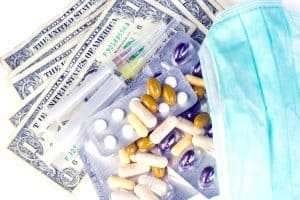
J&J’s ketamine nasal spray for depression continues to impress
pharmafile | April 16, 2018 | News story | Research and Development, Sales and Marketing | Johnson & Johnson, Ketamine, biotech, drugs, pharma, pharmaceutical
New treatments for depression are few and far between; pharmaceutical companies have shied away from trying to develop new therapeutics due to the difficulty in overcoming the placebo effect in treating depression.
This is possibly why researchers and companies are now looking to existing compounds, which have previously not been investigated due to their reputation as party drugs.
MDMA has been investigated for treating post-traumatic stress disorder and Johnson & Johnson has been looking into the use of its intranasal Esketamine, a formulation of ketamine, as a therapy for depression.
The results, revealed in The American Journal of Psychiatry, are promising – in a double-blind, multicentre, proof of concept study showed that the ketamine-based nasal spray significantly improved depressive symptoms, with a rapid onset of action.
The trial saw esketamine used alongside antidepressants throughout the study and looked at whether symptoms of major depression, including suicidality, were improved at four hours after first treatment, at 24 hours and then at 25 days.
In conclusory notes, the researchers suggested: “These preliminary findings indicate that intranasal esketamine compared with placebo, given in addition to comprehensive standard-of-care treatment, may result in significantly rapid improvement in depressive symptoms, including some measures of suicidal ideation, among depressed patients at imminent risk for suicide.”
Improvement on the Montgomery-Åsberg Depression Rating Scale found that benefits were notable at four hours and 24 hours, but were not significant at day 25.
A similar short-term impact was seen when analysing suicidal thoughts, which dipped significantly at four hours after treatment before the effect waned at 24 hours and 25 days.
Though the effect of the drug disappearing by day 25 might be a slightly disappointment, the rapid impact that the treatment is able to make in the short-term is promising – given that antidepressants are known to take weeks of treatment before becoming effective.
A number of different studies looking into the potential for using ketamine for treating depression have sprung up in the last decade. The remarkable results that the drug seems capable of producing in depression have also seen a rise in off-label prescription of the treatment.
However, experts have warned that should J&J receive approval for Esketamine, it would have to be strictly controlled to ensure that the potential for abuse was minimised. North America is already too aware of the dangers of recreational use of prescription drugs, as the opioid epidemic continues to devastate communities.
Ben Hargreaves
Related Content

Johnson & Johnson to acquire Shockwave Medical
Johnson & Johnson (J&J) and Shockwave Medical have announced that they have entered into a …

FDA approves J&J’s Opsynvi for PAH treatment
Johnson & Johnson (J&J) has announced that the US Food and Drug Administration (FDA) has …

Johnson & Johnson acquires Ambrx Biopharma for approximately $2bn
Johnson & Johnson (J&J) has announced that it has successfully completed its acquisition of Ambrx …








